10/1/2017:
Among the years of reports, last summer Daily Emerald reporter Max Thornberry had this about this famously mismanaged office, here. A snippet:
Concerns about the timeliness and effectiveness of the AAEO office [aren’t] new. A 2014 report from the ombuds office found that, “classified staff report high levels of distrust…in the fairness, competence and responsiveness of the University’s AA/EO function.”
And in their motion for a summary dismissal of Chixapkaid Pavel’s lawsuit against SVPAA Doug Blandy and former AAEO Director Penny Daugherty and others, UO’s lawyers have decided to run with that, here:
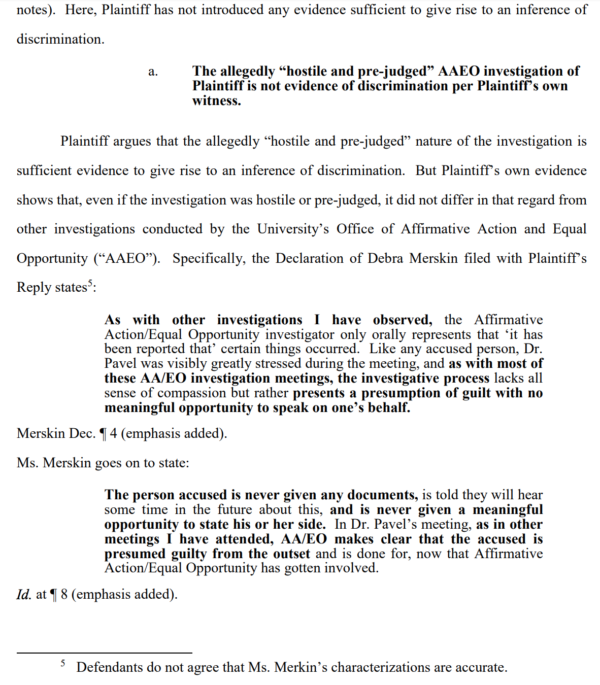

I’m no law professor, so I have nothing to say about the likely success of this argument by Amanda Walkup and Alexandra Hilsher of Eugene’s Hershner Hunter law firm, except that it seems a bit odd to try and use something like this to persuade the Honorable Ann Aiken to dismiss the case, unless you think there’s a pretty high probability she’ll take it as true despite that weasley footnote.
Another aspect of UO’s motion also seems problematic:
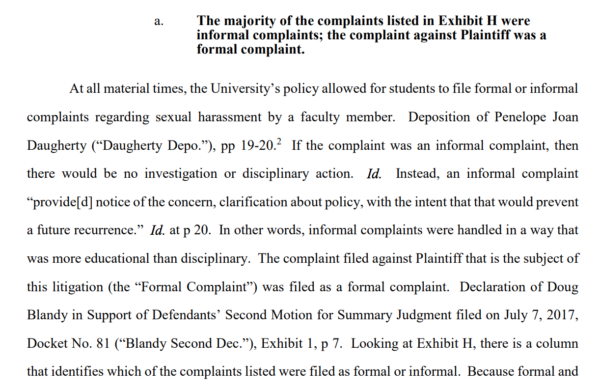
Unfortunately Exhibit H isn’t in the docket, since UO submitted it under a protective order. However, a quick glance through the Bias Response Team documents that UO’s Public Records Office submitted to the Foundation for Individual Rights in Education, here, will reveal at least one recent informal complaint that was submitted to AAEO and led to a full and expensive AAEO investigation and the potential for serious discipline – although the GCO eventually told AAEO to drop it and exonerated the professor.
5/12/2016: Professor Chixapkaid Pavel files suit against UO, Penny Daugherty, etc
Docket here, full complaint here.
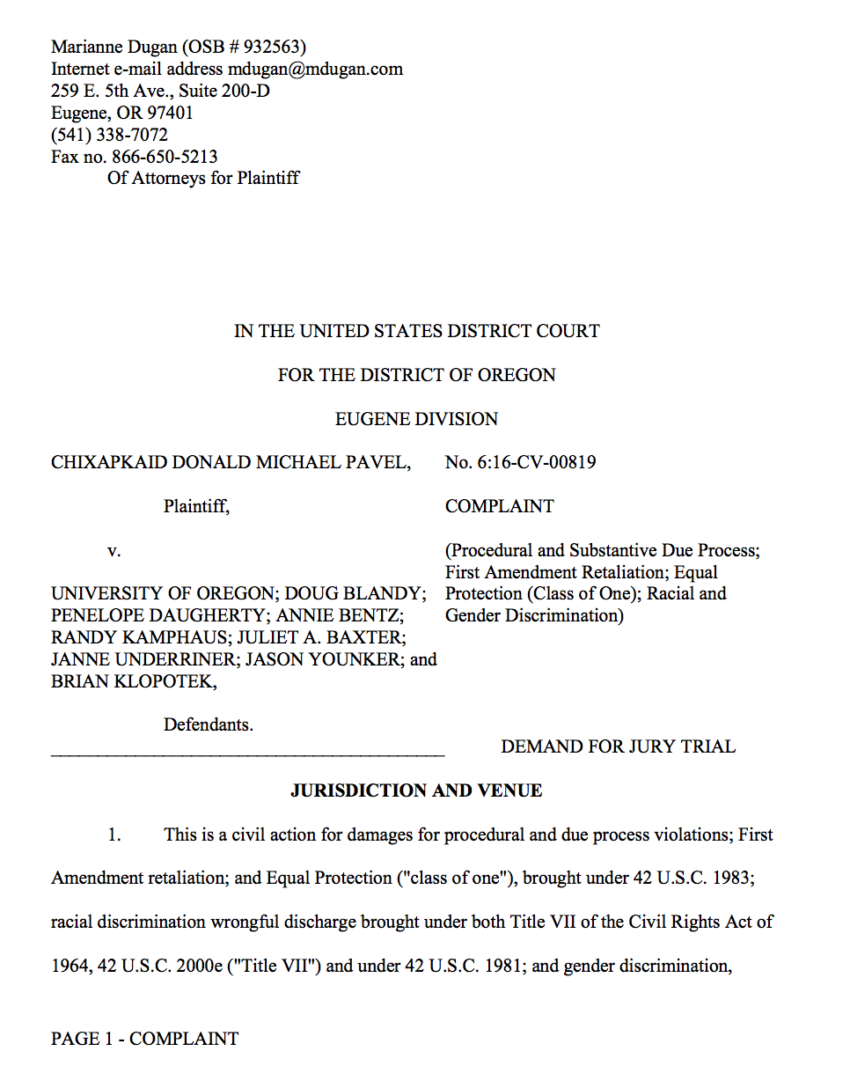
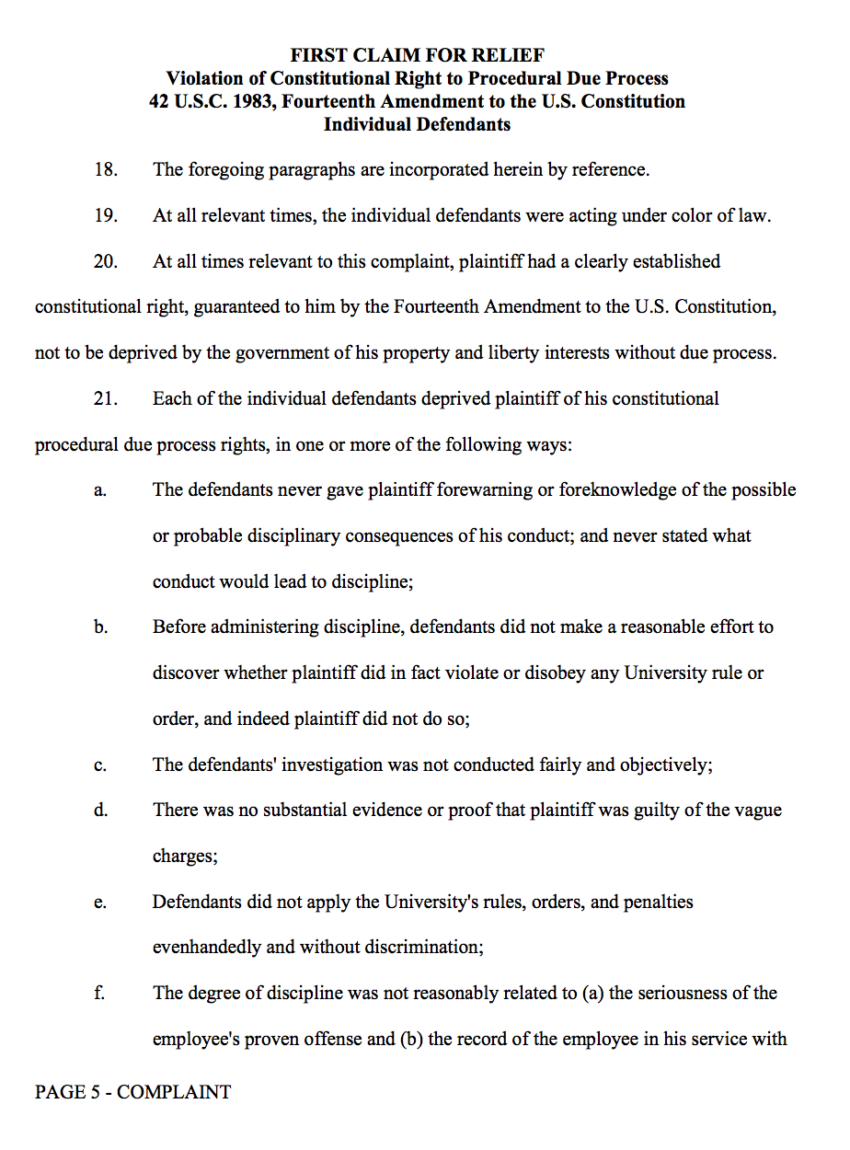
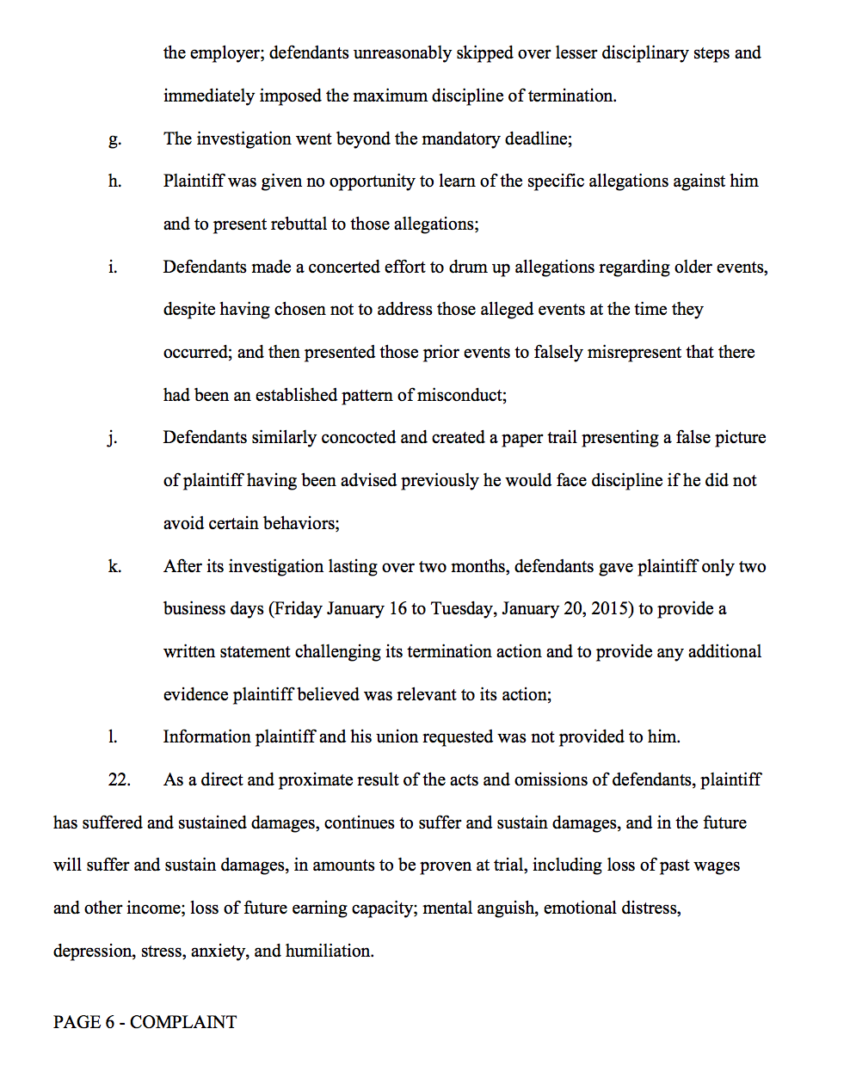
Probably its important to remind the readers about this
https://uomatters.com/2015/03/ed-school-professor-leaves-uo-after-sexual-harassment-allegations.html
http://www.oregonlive.com/education/index.ssf/2016/05/fired_university_of_oregon_pro.html
Yes if true, this allegations are not the type where a faculty member should need prior warning that they are inappropriate!
A do particularly like these parts of the complaint:
Defendants made a concerted effort to drum up allegations regarding older events, despite having chosen not to address those alleged events at the time they occurred; and then presented those prior events to falsely misrepresent that there had been an established pattern of misconduct;
Defendants similarly concocted and created a paper trail presenting a false picture of plaintiff having been advised previously he would face discipline if he did not avoid certain behaviors;
That is classic behavior of at least one of the defendants. Being anonymous here for good reason, I won’t engage in asymmetric commenting by naming names.
Hm. I see a pattern here.
…sounds familiar….
The University was warned about this long long ago. I know, because I warned them. Too bad they didn’t listen back then. Too bad they purposefully didn’t keep records of all the incidents dating back to 2011.
Now, hypothetically, if only someone had the foresight to keep copies of all the emails and meeting notes with all tenures in Education Studies and Deans across the campus that were told and did nothing to protect students, that would probably be really helpful to patching the divots in that paper trail…
But then if someone had all of that documentation and the University used it in court, then the University would open another can o’ worms that showed an orchestrated cover up to silence mandatory reporter(s).
Welp, nothing to do now but await another subpoena. Hopefully, I can get it hand delivered and experience the thrill of someone sneaking up on me in a disguise.
“At all material times, the University’s policy allowed for students to file formal or informal complaints regarding sexual harassment by a faculty member. Deposition of Penelope Joan Daugherty (“Daugherty Depo.”), pp 19-20.2 If the complaint was an informal complaint, then there would be no investigation or disciplinary action. Id. Instead, an informal complaint “provide[d] notice of the concern, clarification about policy, with the intent that that would prevent a future recurrence.” Id. at p 20. In other words, informal complaints were handled in a way that was more educational than disciplinary. The complaint filed against Plaintiff that is the subject of this litigation (the “Formal Complaint”) was filed as a formal complaint. Declaration of Doug Blandy in Support of Defendants’ Second Motion for Summary Judgment filed on July 7, 2017, Docket No. 81 (“Blandy Second Dec.”), Exhibit 1, p 7. Looking at Exhibit H, there is a column that identifies which of the complaints listed were filed as formal or informal. ”
this. can. not. be real.
The title IX coordinator stipulated it was UO procedure to have “no investigation or disciplinary action” in response to “informal” complaints of prohibited discrimination?!?!
“No investigation”?
Are they kidding? That is so blatantly illegal the UO could quite possibly be in a situation now of *never* being able to win a title IX lawsuit. This is potentially catastrophic for the institution. The worst lawyering I have ever encountered.
The obligation to investigate and take corrective action is not ambiguous. It is in the CFR.
“(a) Designation of responsible employee. Each recipient shall designate at least one employee to coordinate its efforts to comply with and carry out its responsibilities under this part, including any investigation of any complaint communicated to such recipient alleging its noncompliance with this part or alleging any actions which would be prohibited by this part. The recipient shall notify all its students and employees of the name, office address and telephone number of the employee or employees appointed pursuant to this paragraph.”
And clarified in tons of guidance etc, like the old DOE Sexual Violence Q and A
“The school may also receive notice about sexual violence in an indirect manner, from sources such as a member of the local community, social networking sites, or the media. In some situations, if the school knows of incidents of sexual violence, the exercise of reasonable care should trigger an investigation that would lead to the discovery of additional incidents. For example, if school officials receive a credible report that a student has perpetrated several acts of sexual violence against different students, that pattern of conduct should trigger an inquiry as to whether other students have been subjected to sexual violence by that student. In other cases, the pervasiveness of the sexual violence may be widespread, openly practiced, or well-known among students or employees. In those cases, OCR may conclude that the school should have known of the hostile environment. In other words, if the school would have found out about the sexual violence had it made a proper inquiry, knowledge of the sexual violence will be imputed to the school even if the school failed to make an inquiry. A school’s failure to take prompt and effective corrective action in such cases (as described in questions G-1 to G-3 and H-1 to H-3) would violate Title IX even if the student did not use the school’s grievance procedures or otherwise inform the school of the sexual violence.”
Even the new interim Q and A clearly requires investigations and corrective actions
“Whether or not a student files a complaint of alleged sexual misconduct or otherwise asks the school to take action, where the school knows or reasonably should know of an incident of sexual misconduct, the school must take steps to understand what occurred and to respond appropriately.2 In particular, when sexual misconduct is so severe, persistent, or pervasive as to deny or limit a student’s ability to participate in or benefit from the school’s programs or activities, a hostile environment exists and the school must respond.3”
and only allows “informal” resolution within the context of an investigation after a a mutual agreement of all parties. You can’t skip the investigation step based off just how a complaint was filed. That is completely absurd.
I can speak from personal experience that AA definitely assumes that all faculty are guilty and treat all faculty as criminals right from the start. This means that any student can say anything they want, without any proof about any faculty that will cause a swift and highly judgmental AA wielded sword to come down on any faculty member. Yes it will get sorted out in the long run but I have never seen or heard of the AA apologizing to any faculty that gets proven completely innocent.
AAEO may have incentives to find in favor of students in these cases, but no such incentives exist to find in favor of classified staff. Quite the opposite in fact.
Some survivors are apparently more equal than others.
Yup. I should have titled this post “Our AA office treats *all* faculty and staff with contempt”.